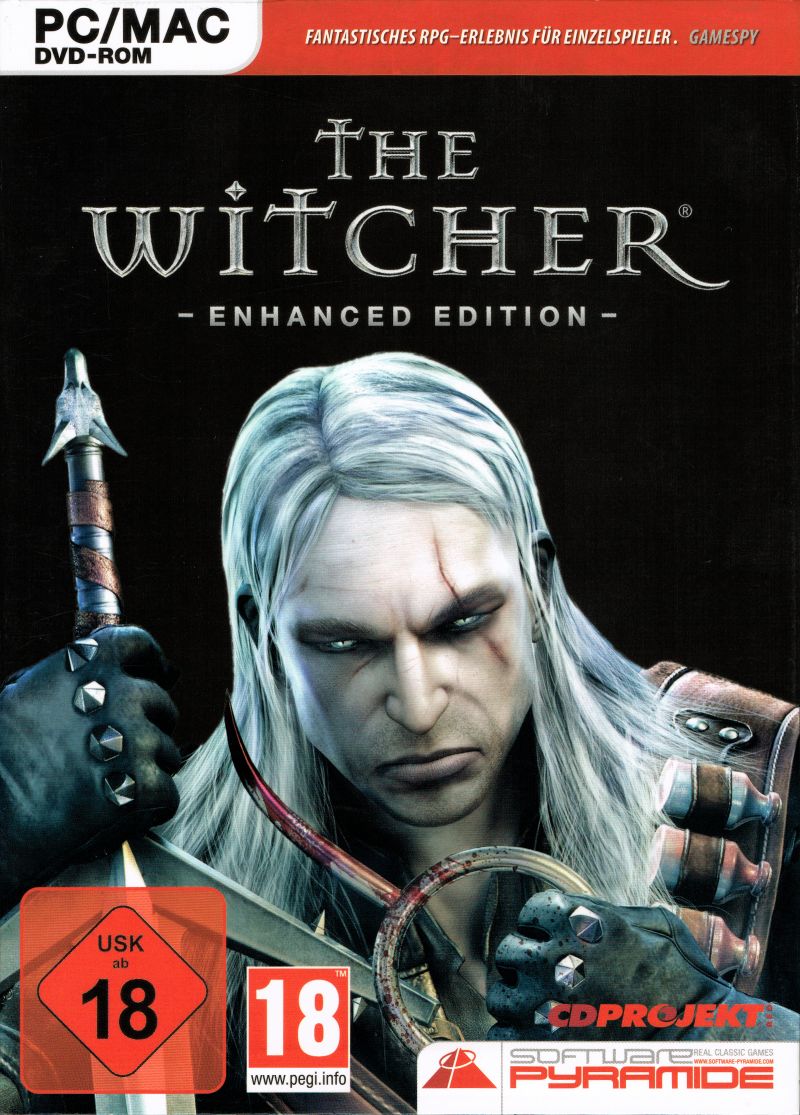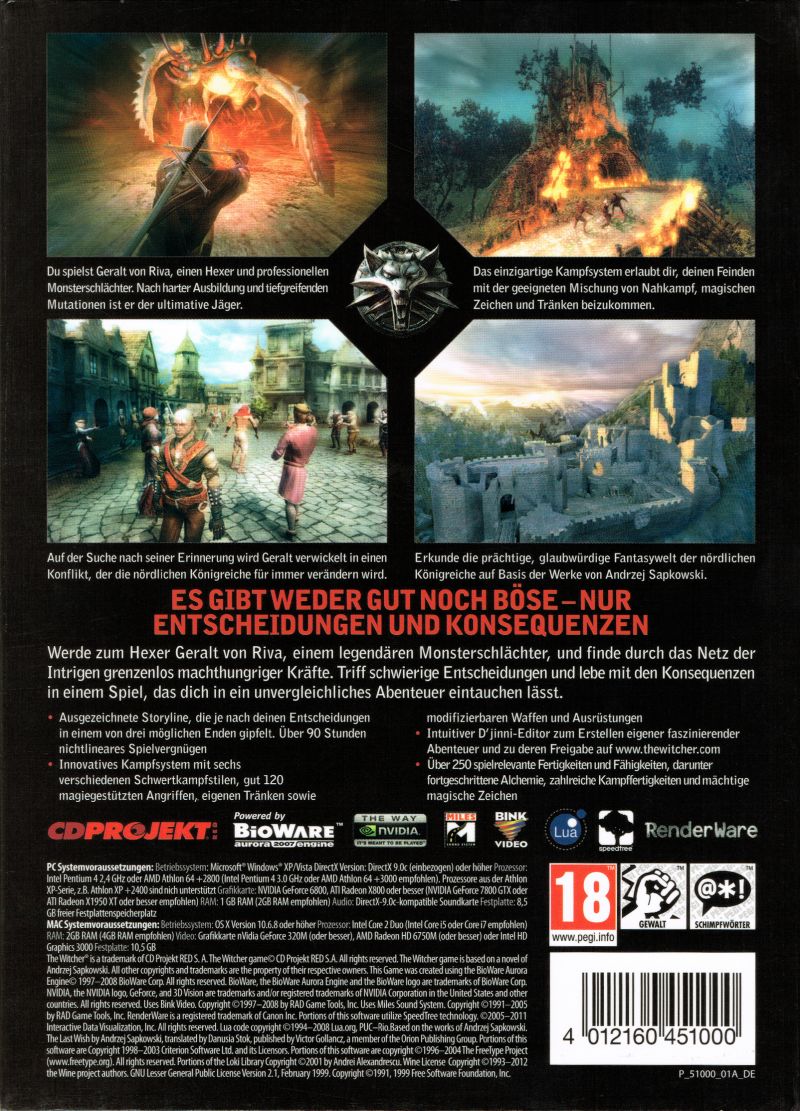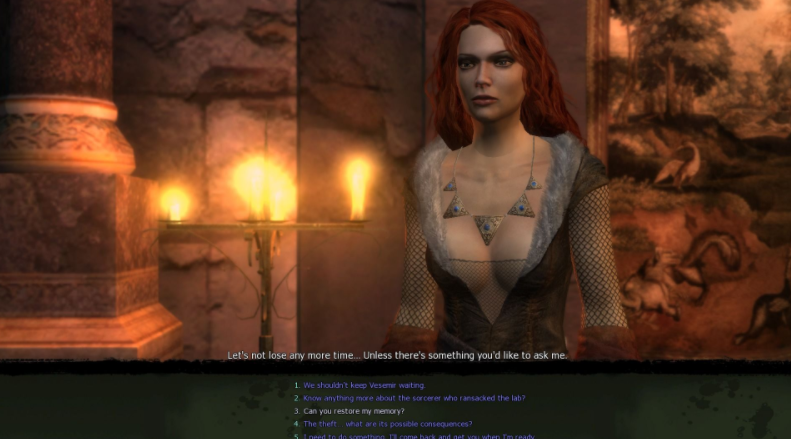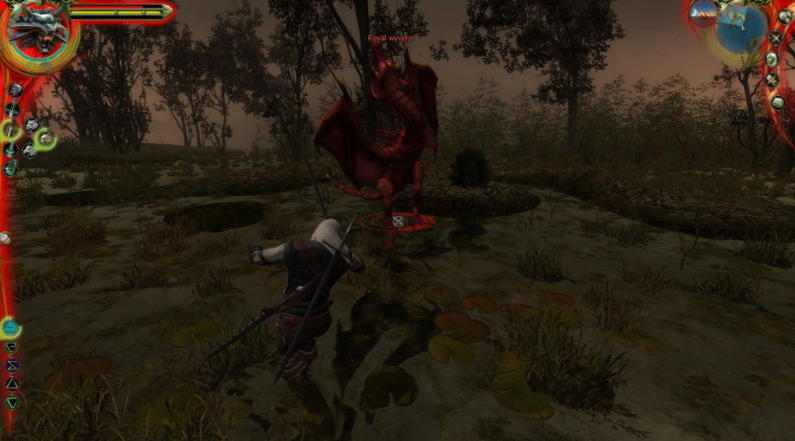The Witcher: Enhanced Edition is a stand-alone, updated version of the original game with the addition of two new scenarios: “The Price of Neutrality” and “Side Effects”. This release includes improvements to animations, character and monster graphics, NPC character models, and translations, and overall game performance. With this edition players can opt to mix and match languages (for instance, hear the voices in French while reading English subtitles).
In addition to the game itself, the boxed retail version contains:
- “Making of” DVD
- 2 Soundtrack CDs
- The short story The Witcher by Andrzej Sapkowski from his book The Last Wish (bound)
- Map of Temeria
- Redesigned game manual
- Official strategy guide
- Artbook (GOG version only)
- Calendar (GOG version only)
The in-game content of the Enhanced Edition was offered as a free download to owners who registered their original game. In some cases the game was later renamed to The Witcher: Enhanced Edition – Director’s Cut when patch 1.5 was released. It removes the nudity censorship of the North American version.
Based on the books by the Polish fantasy author Andrzej Sapkowski, The Witcher is an addition to the RPG genre from Europe, starring the main character from the books – Geralt of Rivia, who is a “witcher” – a professional monster-slayer.
The story begins when Geralt is found unconscious by his fellow witchers. He has lost most of his memories of the past, and joins other witchers when their fortress, Kaer Morhen, is attacked by members of a mysterious organization known as the Salamandra. Most of the enemies are defeated by the witchers, but the two most dangerous ones – a criminal nicknamed “Professor” and the sorcerer Azar Javed – escape after having gained access to the witchers’ laboratories. The witchers part ways, and Geralt heads to the capital city Vizima, hoping to find more information about the assailants.
The Witcher is a dark game with a dark world. War, murder, poverty, genocide, discrimination, torture, fanaticism – are just a few words that describe this setting. This is the world that the humans try to rule, and non-humans like elves and dwarves are subjected to suspicion and sometimes cruel treatment. Will Geralt be a victim to a few sentimental moments of kindness, or will he survive as a cynical bitter murderer? These are the choices that you’ll have to make.
Using a heavily modified engine of Neverwinter Nights, the game implements an original combat system, which requires the player to click on the enemy at the right moment in order to help Geralt execute combo attacks. In order to defeat the enemies efficiently, the player must observe the movements of the combatants, and choose the right combat style: “quick”, which is recommended to use against fast enemies, “heavy”, with lower precision, but more damage output, and “group”, which is effective when Geralt is surrounded. In addition, Geralt often has to switch between his two basic weapons: the steel sword, which is used against regular enemies, and the silver sword, which is more helpful against supernatural creatures.
Character growth is handled by allocating experience points into skills, teaching Geralt fighting styles as well as learning and improving his abilities. Alchemy is a skill that Geralt learns, allowing him to create his own potions, for healing purposes as well as for enhancing his witcher senses. Geralt can also learn and cast offensive and defensive magical spells.
The Witcher requires the player to make ethical decisions for Geralt, which often have “delayed consequences” – for example, sparing a character’s life early in the game will eventually trigger a scene much later, in which said character appears and helps Geralt in return for his kindness. As the game’s plot advances, the player learns more about the social and political life of its world, and is able to choose his/her own path and alliances to different organizations and ideologies
Cover Art:
Screenshots:





